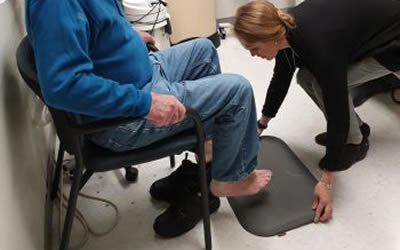The VA’s new prescribing guidance for continuous glucose monitors significantly expands the number of veterans with diabetes who are eligible for the devices.
‘Happy Hypoxia’ Might Not Be Such a Mystery After All in COVID-19
Earlier in the COVID-19 pandemic, physicians were often baffled by patients who presented with extremely low levels of oxygen. Although oxygenation was so low it was potentially life-threatening in some cases, patients showed no obvious difficulty in breathing.
Data Predicts Life Expectancy of Older Veterans With Diabetes
BOSTON—Can the five- and 10-year life expectancy of older diabetes patients be predicted by history of co-morbid health conditions and medication? A new study suggested it can. The VA Boston Healthcare System-led study suggested that the ability to make such...
AI/AN Patients Faced Diabetes Care Disparities Within MHS
BETHESDA, MD—Readmissions following hospitalization for diabetes often occur and are more common in minority patients, who experience greater rates of complications and lower quality healthcare compared to white patients. A study in Military Medicine examined...
COVID-19 Pandemic Might Lead the Way for More Inpatient CGM Use
Devices Allow Remote Monitoring of Blood Glucose Levels ATLANTA—A silver lining in the dark cloud of the COVID-19 pandemic might be that healthcare systems have been forced to reconsider many processes, especially those involving close contact with patients. According...
Weight Gain May Endanger Some Benefits of Hepatitis C Cure
NEW HAVEN, CT—A year ago the VA announced it had eliminated chronic infections with hepatitis C virus in all veterans willing and able to be treated. More than 100,000 veterans achieved sustained virological response or a cure with the help of direct-acting antivirals...
Insulin Errors Potentially Plague Hospitals Treating Diabetes Patients
Guidelines from the Institute of Safe Medication Practices have pointed out that insulin is associated with more medication errors than any other type or class of drugs. With more than 11,400 insulin-using veterans hospitalized in a recent two-year period at the VA, that is an especially critical issue for the healthcare system. Intense focus on avoiding problems with insulin, as well as new products, have improved the situation, both with subcutaneous administration – such as insulin pens – and with intravenous insulin in the critical care setting.
New Focus in the Fight to Reduce CV Risks in Type 2 Diabetes
At one point, intensive glycemic control was seen as a magic bullet to keep Type 2 diabetes patients from developing cardiovascular disease. That approach faded, however, when VA research cautioned that any benefits of intensive therapy must be weighed against adverse effects such as hypoglycemia and weight gain. Now the focus has shifted to better medication selection, with guidelines suggesting that, for Type 2 diabetes patients who have cardiovascular disease or are at high risk for it, therapy including an SGLT-2 inhibitor or GLP-1 RA should be considered as optimal treatment.
Servicemembers With Uncontrolled Diabetes Allowed to Remain In Military
While, in general, the U.S. military will not accept recruits diagnosed with diabetes, that is especially the case with patients who use insulin, which is seen as an automatic disqualification. The situation is different, however, in military personnel already serving. While most of those retained after diagnosis have well-controlled blood sugar, about a third have hemoglobin A1c measures greater than 7%. That’s why the ability to closely monitor those servicemembers with tools such as continuous glucose monitoring is increasingly important.
Too High Rate of Diabetes Therapy Intensification at VA Hospital Discharge
BOSTON — About 10% of older veterans discharged from VAMCS had their diabetes medication intensified, even though half of them were unlikely to benefit because either they already had reached their blood glucose goals or had limited life expectancy.
Veteran Study Links DPP-4 Inhibitors to Greater Joint Pain Risk
MORGANTOWN, WV—Dipeptidyl peptidase (DPP)-4 inhibitors appear to be associated with joint pain in older veterans who receive care at the VHA but also are Medicare beneficiaries, according to a new study. The report in American Health Drug Benefits pointed out that...
With Obesity, Moderate Hyperglycemia Hastens Cognitive Decline
PITTSBURGH —What precisely is the relationship between cognitive decline in patients with both diabetes and obesity? Researchers from the VA Pittsburgh Healthcare System and the University of Pittsburgh sought to investigate the potential mechanisms leading to those...
VA Steps Up Foot Mat Program to Prevent Diabetic Foot Amputations
WASHINGTON—For diabetic veterans, a new device available through the VA may prevent foot ulcers—and possibly amputations. The VA treated more than 75,000 diabetic foot ulcers last year at a median cost of $47,000. That’s more than $3.5 billion just for foot care....
Common Blood Test Identifies Veterans at High Risk of Diabetes
ATLANTA—A test included in nearly all routine blood chemistry panels provides a surprising window on a patient’s future health. The random plasma glucose test—at levels previously considered unremarkable—can predict whether a patient is likely to develop diabetes in...
PTSD Increases Risk of Early Stroke, TIA in Young Veterans
More Significant Risk Factor than Diabetes, Sleep Apnea CHAPEL HILL, NC—Developing posttraumatic stress disorder as a young adult doubles a veteran’s risk of a transient ischemic attack before middle age, according to a new study. The research, published in the Stroke...
Intensifying Diabetes Treatment Increases Short-Term Mortality for Veterans
NASHVILLE, TN—Adding insulin or sulphonylurea to metformin increased the risk of death among veterans with diabetes in the initial six- and 12-month period, according to a recent study. Insulin increased the risk of death 66% more than sulfonylurea at six months, but...
Metformin Linked to Reduced Cardiovascular Events in Certain Veterans
Compared to Sulfonylureas in Patients with Impaired Kidney Function NASHVILLE, TN—It wasn’t that many years ago that prescribing metformin for Type 2 diabetes patients with impaired kidney function was discouraged for safety reasons. Now, in an about-face, a new VA...
Successful PTSD Treatment Halves Diabetes Risk for Veterans
LOUIS—Improving post-traumatic stress disorder symptoms, a laudable goal itself, has the added benefit of lowering patients’ risk for developing Type 2 diabetes, according to a new report. A cohort study by Jeffrey Scherrer, PhD, professor of family and community...
Pharmacist Medication Management Helps Diabetic Veterans, Physicians
Older age, obesity and Agent Orange exposure create a trifecta of diabetes risk for the VA.
Metformin Reduces Dementia Risk in Black Veterans With T2D
ST. LOUIS—Use of metformin for Type 2 diabetes significantly reduces the risk of dementia among African American male veterans older than 50, according to a large observational cohort study.
Decompensated Diabetes More Common in Certain Racial, Age Groups
ATLANTA—Which diabetes patients are most likely to have decompensated diabetes, defined as diabetic ketoacidosis and hyperosmolar hyperglycemic state?
Tight Glycemic Control Increases Fracture Risk in Veterans with Diabetes
DURHAM, NC — Diabetes mellitus among older men has been associated with increased bone mineral density but paradoxically increased fracture risk, according to a study in the Journal of Bone and Mineral Research.1
Metformin Halves All-Cause Mortality in Frail Older Veterans
Other Important VA Studies at the American Diabetes Association 79th Scientific Sessions MIAMI—The first-line drug of choice for Type 2 diabetes, metformin has long been known to effectively reduce blood glucose levels and substantially cut the risk of cardiovascular...
Greatest VA Weight Gains in Women Veterans Without Diabetes
ATLANTA—How does a diagnosis of diabetes affect weight management among U.S. veterans? A study in the journal Obesity (Silver Spring) sought to assess weight trends and diabetes prevalence among U.S. veterans.1 Atlanta VAMC researchers and colleagues used Information...
Diabetes Patients Do Well in Military Healthcare-to-VA Transition
SAN DIEGO—When service members leave active duty and receive healthcare in a different setting, care for conditions such as diabetes can suffer. A study in Military Medicine pointed out that changes in healthcare have been shown to decrease diabetes care compliance...
NPs, PAs Have as Good Diabetes Outcomes as Physicians
DURHAM, NC—So-called physician extenders do as good a job as physicians at the VA in helping to achieve good outcomes in diabetes patients, according to a new study. The report in Annals of Internal Medicine focused on primary care provided by nurse practitioners and...
Veterans on Standard Diabetes Care Face Dangers from Hypoglycemia Subhead: Post-hoc VADT Analysis Links Low Blood Sugar to CV Events
BALTIMORE, MD—A post-hoc analysis of the Veterans Affairs Diabetes Trial (VADT) once again shines a spotlight on the dangers of hypoglycemia in veterans treated for Type 2 diabetes. The study published in Diabetes Care found that severe hypoglycemic episodes within...
Is Prandial Insulin or Noninsulin Agent Better for T2D Treatment Intensification?
Some veterans with type 2 diabetes patients can’t reach their hemoglobin A1c goal despite using metformin, basal insulin and a sulfonylurea. What should come next?
Caution Urged in Use of Sulfonylureas in Some T2 Diabetes Patients with CAD
VA clinicians should exercise caution with use of sulfonylurea in some patients with co-morbid type 2 diabetes and cardiovascular disease, according to new research.
Hypoglycemia Concerns Help Drive Use of Continuous Glucose Monitoring at VA
As the VA increases its focus on minimizing hypoglycemia in veterans with type 2 diabetes, it expects that more physicians and veterans will consider using continuous glucose monitors to meet that goal.



